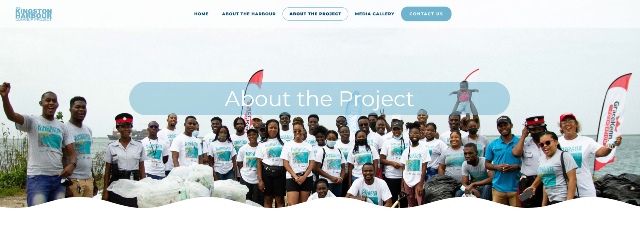By Debbie Ransome
Going beyond the basic storyline to dig deeper into the Haitian reality and how it gets reported, this

[This article was originally published on the author's website Petchary's Blog in February 2024 and is reproduced with the kind permission of the author.]
It’s everywhere. It’s insidious. Whether it’s on a beautiful trail in the Blue Mountains, on a riverbank, on a beach, or in a noxious gully in any urban centre in Jamaica… Plastic is there. I shudder to think what overseas visitors notice when they step outside the environs of their all-inclusive hotels. And believe me – they do notice. Somehow we seem to have gotten so used to it that it has become almost part of the landscape. Sooner or later, much of it will end up in the sea, causing lasting damage to marine ecosystems. I saw a picture recently of a hermit crab making its home in a single-use plastic cup.
Recently, Jamaica Environment Trust published the results of last September’s International Coastal Cleanup Day event. The level of participation from volunteers and partners was, as usual, tremendous, with 6,859 volunteers registering from 106 groups across the island. They cleaned up 145 sites and collected 78,704 pounds of garbage, filling 5,437 garbage bags. A total of 183 cleanups were conducted, covering a distance of 106.98 miles of coastline. The Government’s Tourism Enhancement Fund has provided great support in recent years to this effort, and I really hope they will continue; there is nothing worse for our “image” than streets littered with plastic.
It was no surprise to learn that most of the “Top Ten” types of items collected on our coastlines in one day last September were plastic, with plastic drink bottles and bottle tops leading the way with a combined 39% of items picked up. It also worries me that our love of takeaway “box food” continues to boost our production and use of single-use plastic knives, forks, spoons, cups and plates.
As Minister responsible for the Environment Matthew Samuda noted recently, the ban on styrofoam containers for these meals has resulted in the importation of hard plastic containers, which cannot be recycled. We really need to work on this aspect of our plastic obsession, and the hundreds of cook shops around the island need to get in line – even if they do have to put their prices up a bit.
I understand that Minister Samuda is considering a ban on the importation of products containing microplastics, which is another conversation altogether. At the moment he is busy opening water pipelines and campaigning, but I hope he will get back to this particular issue soon. In January, at the opening of a new Recycling Partners of Jamaica (RPJ) facility in Naggo Head, the Prime Minister announced that a programme aimed at separating plastics and other recyclables in government ministries, departments and agencies will start later this year.
Now, JET has released a one-minute, animated video titled “Plastic-Free Paradise.“ Another in the series is named “Small Plastics, Big Problem – Jamaica’s Battle with Plastic.” These need to be widely shared and played in schools, from kindergarten age upwards. The videos were funded by the United Nations Development Programme (UNDP) and implemented by the Global Environment Facility (GEF) Small Grants Programme (SGP).
Local companies are indeed making efforts, and it’s not all “greenwashing.” Jamaica Inn has an impressive set up of solar power, rainwater harvesting and recycling. Sagicor partnered with RPJ on the huge charity run in Kingston last week, collecting over 15,000 plastic bottles at just that one event. Kudos to them. Partnerships are critical.
Meanwhile, The Ocean Cleanup has been impressing everyone as it steps up its activities at Kingston Harbour. The organisation reports:
We have deployed 7 Interceptors in all of Kingston Harbour gullies to prevent an estimated 900 tons of trash from flowing yearly into the harbour and into the oceans.
This has not been a single-handed effort, but a partnership, the Kingston Harbour Cleanup Project, supported by a local company with its headquarters downtown, the GraceKennedy Foundation and a non-governmental organisation, Clean Harbours Jamaica. Importantly, it’s a community-based effort.
These are high-profile efforts. However, taking individual responsibility, as well as collective action, is critical. As JET notes: “simple actions can contribute to a cleaner and greener Jamaica.” These simple actions can be taken by individuals. The French Ambassador to Jamaica pointed out in a tweet (sorry, post) on X that while on a hike he walked for quite a long way with his empty plastic water bottle until he found a suitable receptacle for it. We need to get into these kinds of habits.
We know we can do better; let’s try harder. Much harder.
Emma Lewis is a writer, social media activist (find her on Twitter/X @Petchary) and NGO supporter/board member.
By Debbie Ransome
Going beyond the basic storyline to dig deeper into the Haitian reality and how it gets reported, this
[photo: Patti Smith & Winston Rodney, cred Ted Bafaloukos]
In a year of global challenges and fall-out, we at Caribbean Intelligence© have focused on the aspirational side of Caribbean life.